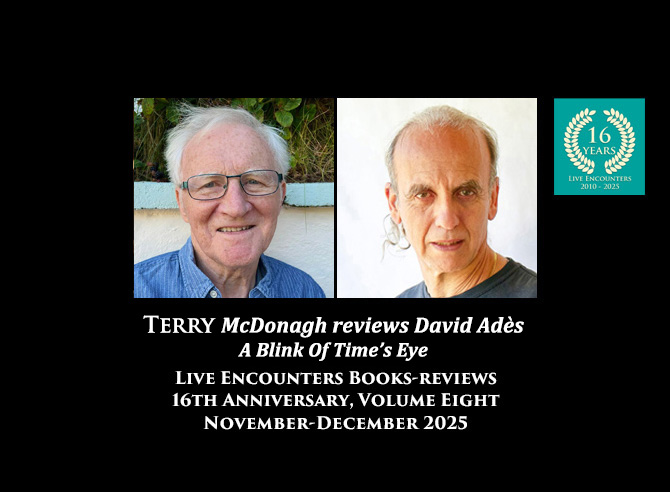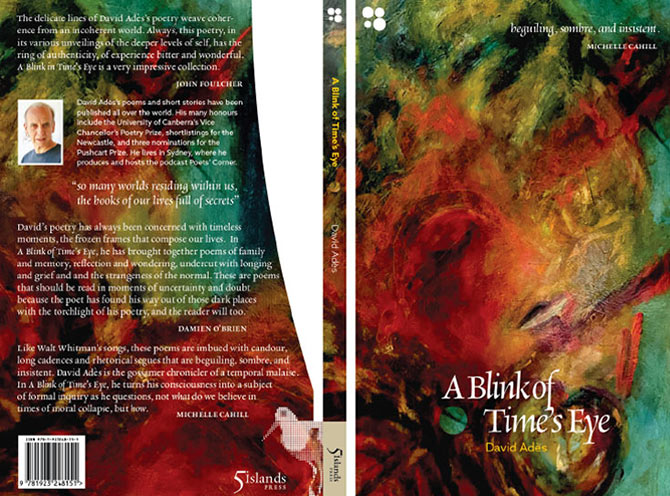
Live Encounters Books-Reviews Volume Seven
November- December 2025
Terry McDonagh Review of
A Blink Of Time’s Eye, poetry collection by David Adès.
5islands Press, October 2025

‘Time’s eye has blinked before and will again’ – a line taken from a poem in this wonderful collection, ‘At the Blink of Time’s Eye’ by poet, David Adés. Time drones on and drones over us and we can wriggle and defy with flailing fists and fearsome words but time will continue to blink, un-blink and carry on in its relentless fashion. We can work hard, hang about, have partners, no partners, children, no children – even be a major success and clap ourselves on the back hoping that monuments to our legacy will be scattered about the landscape – but time will open and close that great eye in a blink.
It’s hard to know where to begin with a review – we read the poems, scroll up and down, look for a hook and try to take off. David Adés loses no time in handing us a perfect way in to his excellent collection: his poem, ‘What Was I Looking For’ presents with a poet out and about searching for meaning in the cracks and crannies of a topsy-turvy world ‘a thing skirting my senses/ that I pursued for decades/ sometimes with purpose and vigour/ sometimes only from habit,’
His search is endless but he, finally, finds what he had been craving and searching for in a graveyard – ‘a blaze of flowers blooming’. I sense ‘this blaze of flowers blooming’ is the rich torch that permeates the entire collection. It is the silent, colourful, hidden secret we humans yearn for – and here we sense a poet leaving no stone unturned in his search for purpose, dignity, meaning and identity. His is a deeply spiritual journey of criss-cross trails, suggesting a multitude of options – journeys back into Egyptian liberation – to the sad lot of his mother born into the time of Anna Frank. ‘faith does not abandon us, faith dances/ daring to ask of God: what plan is this?’
In the poem, ‘Imprints in Clay’, he tells us ‘ It isn’t clear what we are doing/ imparting the stories of our lives/ the flimsy architecture of belief/ our motivations obscure even to ourselves/ trying to imprint something lasting/something to, at least, be remembered by/ if not a kind of immortality.
By now, the poet has set out his stall – he has me in his spell…where he wants me. What is really real, unreal, normal, abnormal. Search is real – care, family and love are real…that’s for sure. We are being drawn into timeless moments – a bit like working our way through a long strip of impressions that depict so-called normal living, past present and good things to come if we can believe in goodness and, perhaps, shades of immortality.
Several of these poems are reactions to thoughts and reflection on the nature of what it means to be truly human…so beautifully depicted in the poem a, A Place I’ve Never Been:
So, I find myself/ always in the throes of arrival/and of departure/dragonfly hovering/always in the known/and the unknown/ always waking and falling asleep/ always clothed and naked/always holding on to and letting go/ comforting myself/ with the presence of body/ with the illusion of familiarity/ again, the snow is falling/ and the magnolia’s petals/ will turn brown and fall/ our home of three years/ our noise, our clutter/and we, all five of us /are in the throes of departure/and of arrival/ where we are /where we’ve never been.
David Adés’ world is a world where the pursuit of temporal success and profit is secondary – much more important is family life – his meditation and reflection on things that concern us all – that really matter. The human condition presents and confronts us with moments of joy, but also with despair and uncertainty, and instead of acknowledging and addressing these emotions, we, often, try to avoid them or push them to one side – replacing them with the language of loud noise and material gain.
There is: scream going on and on, piercing night/ until a vigorous shake of arms/ a voice, a glimmer of light/ tossed and turned away from fear/ from sweat, from the stampede within/ the mad, adrenalin rush of dream.
And in ‘Once, Your Voice on the Phone,’ the poet opens up and gets delightfully personal – bordering on the erotic but hinting at sadness and an inevitable ending: Once, your voice on the phone / low, husky, wished I was with you / in my nakedness / as I had been with you before/ as I would be with you again—though this too would end/ At your door I stripped naked/ hoping the neighbours wouldn’t see/ my body a mischief, my body a laugh/ for the look on your face/ the gleam in your eye/ as you opened the door, as you let me in.
This collection is fascinating in that it addresses whole chunks of the underbelly of human existence: what do we mean – in the broadest sense of the word – when we talk of an authentic life well-lived? In A World unto Herself —for Sarai, the poet is very much in the transient and present world, conscious of baggage but loving his wife and children – family life means everything. He bemoans the passage of time –it is fleeting and won’t come back. His little daughter has her games and parties but they too will pass. We cannot save or hold on. These are the everyday considerations ‘The Daily Cocktail’ of a dedicated family man trying to live each moment/ the mingled swirling soup of life/ my daughters—their hair coconut-scented from shampoo—breathing in a little attitude, a little mischief / a touch of genius/ terror or ecstasy, or just a word/ another day of little decisions/ like taking the rubbish out/ Alex lifting his hat to reveal a haircut gone awry / and my older daughter telling her chess tutor about the book she’s reading.
The collection, ‘A Blink of time’s Eye’, is the work of a mature poet. He enriches our lives in so many ways – a bit like finding new ways of talking about the beauty of family life – of examining and probing into the great questions we must all address if we wish to be considered truly human. ‘The Myriad Lives I Lead Inside My Own.’ Observe the day/ in those few quiet moments left to reflect…
as I make my way, script unfolding line by line,
to wherever it is I am going.
This collection is an honest and detailed examination of a poet in his world and each poem is a world in itself.
© Terry McDonagh
“I have appointed myself detective to my own life,” David Adès writes in “Today’s Weather.” And nothing escapes the gaze of this persistent and perceptive investigator. This strange and unusual sort of detective work is undertaken not with any expectation of finding clear answers, but with finding a way to live with the realisation that they will never be found. The result is a book of bifurcations and multiplications; of roads taken and not taken; of living between the “here” and the “there”; of presences that look like absences, and absences that are oppressively present; and “of every prior certainty/burnt beyond recog-nition” (“Smoke”).
The unexamined life, we were told many years ago, is not worth living. David Adès has taken this advice to heart; and through his rigorous scrutiny of a rich interior live, he has produced a volume of poems worth living for.
the books of our lives full of secrets.”
© David Adès

